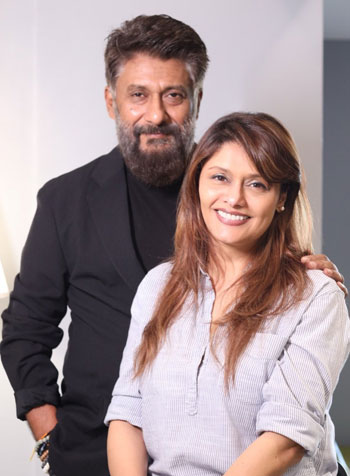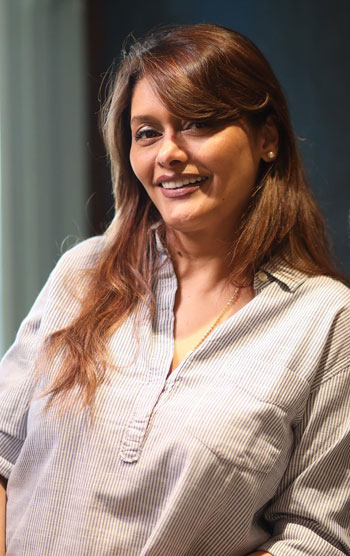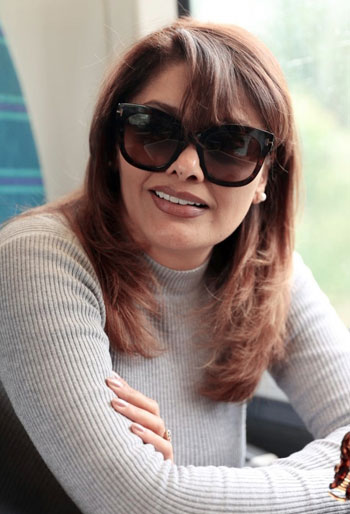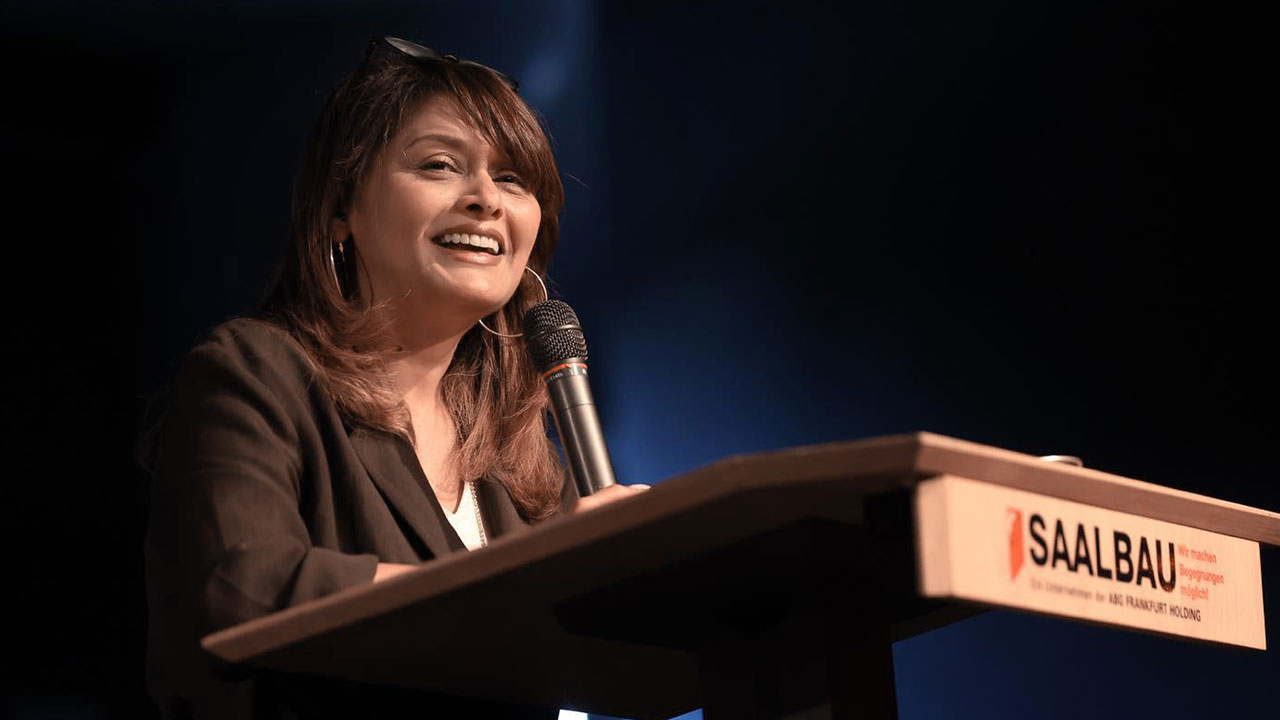Pallavi Joshi : A half century in the film industry !
Pallavi Joshi started her acting career at the age of four way back in 1973. Even after 50 years she is still active in acting field and so far has bagged most prestigious National Awards for acting, thrice. This is an indication of the prowess of her acting and performances. Pallavi’s first #NationalAward was for ‘#WohChokri’ in 1992 and in recent times she has won two National awards for Best Supporting Actress for films, ‘#TheTashkentFiles’ & ‘#TheKashmirFiles’ in 2019 and 2022 respectively.
 #PallaviJoshi’s parents were stage actors and her brother #MasterAlankar was one of the most sought after child actors in the seventies and his portrayals of #AmitabhBachchan’s characters’ childhood in films were most famous. He was a #BigB of child actors. His sister Pallavi, after growing up, treaded the path of parallel cinema. She was a favourite performer of parallel cinema directors including #ShyamBenegal and #GovindNihalani. Pallavi has also worked in multiple languages viz. Marathi, Malayalam, Kannada. She is a very good singer and had co-hosted tv’s popular music show #ZeeAntakshari for five years. She also anchored a television singing reality show Sa Re Ga Ma Pa Marathi L’il Champs. Pallavi Joshi, in recent times, has been active in films with her husband #VivekRanjanAgnihotri and now has turned producer too. Her last film was ‘#TheVaccineWar’ and during one of the promotional events our Senior Editor Keerti Kadam happened to interact with her. Excerpts….
#PallaviJoshi’s parents were stage actors and her brother #MasterAlankar was one of the most sought after child actors in the seventies and his portrayals of #AmitabhBachchan’s characters’ childhood in films were most famous. He was a #BigB of child actors. His sister Pallavi, after growing up, treaded the path of parallel cinema. She was a favourite performer of parallel cinema directors including #ShyamBenegal and #GovindNihalani. Pallavi has also worked in multiple languages viz. Marathi, Malayalam, Kannada. She is a very good singer and had co-hosted tv’s popular music show #ZeeAntakshari for five years. She also anchored a television singing reality show Sa Re Ga Ma Pa Marathi L’il Champs. Pallavi Joshi, in recent times, has been active in films with her husband #VivekRanjanAgnihotri and now has turned producer too. Her last film was ‘#TheVaccineWar’ and during one of the promotional events our Senior Editor Keerti Kadam happened to interact with her. Excerpts….
 You are more into doing content based cinema. Your views?
You are more into doing content based cinema. Your views?
Right through my career I have been doing films which want to say something. Cinema’s aim is to entertain but it should also educate people. When we started making films, it was a conscious effort to make film which ‘talk’. We started making content-based cinema. In fact what had happened was, both Vivek and I, we had both got to a point where we thought that there is nothing left in films, there were no new subjects coming, there was nothing that held our interest. It had come to a point where we felt that if you’ve seen one you’ve seen them all. And that was a very depressing thought for somebody who has been a part of the film industry, so both of us decided to do something about it. I said if we can ‘Talk the Talk then we should also Walk the Walk’. And we said we’ll make our kind of films. Why should we depend on people? Why should we say that someone will come and make the film? When we started making the film, it took us a lot of time. At that time I had a thought in my heart that maybe we’re not cut out for this or maybe the film industry is not ready for this, or maybe the time is not right. But that thought came into our mind when the film, ‘Buddha In A Traffic Jam’, was still in process, but as soon as it came out, we did a technical release and then we put it on YouTube for people to see, and Vivek started taking it to people directly. He said, ‘I have made the film. If nobody is going to release my film, what stops me as a filmmaker, as a story teller to take it directly to people?’ So he started taking it to colleges and institutions and the response we saw, we realized that what we were thinking was not wrong. We always operate from a point of view where we know that the audience is intelligent, we don’t have to dump our films down. In fact we make the most complex films, and we have the most complex of characters, and people take it very well.
Many big films with big stars, big production houses has failed to work in recent times, barring a few exceptions. They were Masala films but how important do you think that the realistic cinema or real stories are necessary to be portrayed on the screen?
Look, you can view this in different perspective. According to me cinema is not only for entertainment, because for entertainment you have a lot of other things too. I view cinema as a form of art, and when you practice an art form then a classical background is very necessary. When you talk about Hindustani music, or any of our Indian dance forms like Kathak, Bharatnatyam etc. all these are classical based and you have to practice to master that. Similarly cinema is also an art form, therefore the classical practice or efforts have to be taken or done mandatorily, for e.g. when you look at a painting, a painter has made a painting but you go and explore various things in that painting that maybe the painter has missed out on, how he has used the colors, how the lighting has been done, what are the brush strokes, what does the painter want to convey through his painting, what use of colors makes it a dark painting or makes it a very brilliant painting or makes it a happy painting. According to me in the same way cinema too is open to a lot of interpretations and we should give the audience that much time and space where they can come and find the new answers in your film. There are love stories, there is romance all these genres are necessary too, I am not saying that they shouldn’t be, however along with those this genre has never taken place in our film industry, and when it came, Shyam Benegal, Govind Nihalani and all brought this form, however it got lost somewhere in the middle. So we thought that why not we bring back that form? Our audience is pretty matured. There was a time when quality films used to be made that portrayed social issues etc., Bimal Roy’s films, even Raj Kapoor sir’s films, I really used to like those films. He always spoke about what was happening in the society, and our hero used to always be the underdog who would then go and achieve monumental things in life. Hence somewhere as a society we used to identify with the hero, now that identification has been lost somewhere, for me also, even though I am an actor connected to the film industry. However whenever I see any glamorous or extra glamourised heroine on the film screen, I think that, yes she is a heroine, I never view her to just be a woman. She always comes across as a heroine. In spite of being an actress I can never look like that, so how a common woman is going to identify with her? Somewhere you need to have that bit of realism, there has to be relatability. Hence, we thought that we’ll make something that is very identifiable with people keeping in mind that the audience is extremely intelligent.
 Now you and Vivek sir are established as a brand. There is a section of audience that has hopes from you, trust you that whenever you make something that will be good. Do you feel that pressure?
Now you and Vivek sir are established as a brand. There is a section of audience that has hopes from you, trust you that whenever you make something that will be good. Do you feel that pressure?
There is Pressure, however pressure is the wrong word, I call it responsibility. The sense of responsibility starts increasing, it’s like, if I explain it in a very simple way then, when you’re newly married you wish you have a child, then you give birth to a child, but after giving birth to a child you realize that it’s a big responsibility, and it’s not an easy one, still you take on that responsibility, and raise that child, and when that child starts working nicely, and when your neighbour or any other person praises your son or daughter then you get a satisfaction of job done well. That is necessary for us to achieve, so now the child has been born and we are nurturing and raising it.
A political interference has been seen around your recent films. How do you handle those circumstances?
Political people who come to watch our movies don’t have any interference between them and us. And the ones who don’t come to watch our movies if they feel that we are doing political interfering in our film industry then why is it bothering them who don’t watch our films. Our audience is happy with us and yes we make political films. I am not shying away from this whatsoever, we do make political films, because it’s important to make political statements as well. And every individual has their own take on the situation, they have their own views. So we keep our own view in the films and I don’t think so there is anything wrong in that. Moreover our audience doesn’t find anything wrong in that, and the ones who do don’t come anyways, if they’re not my audience I don’t think I should care about them.
Before “The Vaccine War” we started getting emails which asked us to avoid releasing the film or else the outcome won’t be good. Now what can we do with that, we have to just ignore it and keep doing our work. The ones who had a problem with “The Kashmir Files” they are the only ones who had a problem with “The Vaccine War”, the same section of people. During Kashmir Files people assumed that we have made the film on religious issues but they were wrong. And how did religion come in the vaccine? Then are they anti vaxxers as well? What can I say now, they have a problem with us basically. I’ll keep doing my work.
I should appreciate that you guys are promoting women in the industry, as in highlighting their achievement through The Vaccine War.
Not just women, I think we are promoting everything that is Indian. Some of our stories are like an eye opening factor for our country, because when we talk about democracy, this might have come in your mind as well, and you must’ve written about it too. That democracy should have some importance. In our country we couldn’t see that for many years, even now there are many things that we feel are not right. We should always speak against it. This is our democracy, therefore talking about it or giving views on it is our right. We have that freedom of speech and we need to achieve that freedom of speech. If someone is trying to suppress your voice then we should scream it aloud, because you cannot take this in a people’s land, we speak for us all as a whole. I am the common person of India, you are the common person of India, everyone is, even Mr. Ambani is a common person of India. Just because he has the most amount of wealth doesn’t make him any different from you and me, when it comes to his rights as a citizen of India. Hence, we all should keep on doing our work, there will always be naysayers, there will always be people who’ll try and pull you down. If we feel this way then the ones who run the country, how much would they feel? So just keep doing your work.
 You have become a producer now. What are the challenges you faced?
You have become a producer now. What are the challenges you faced?
When we make films like ‘The Vaccine War’, it gets difficult to get financers, distributors and studios to back it. During ‘The Kashmir Files’ we didn’t get any means for making the film, “The Tashkent Files” was produced by someone else, I was there in that as a producer however I was a creative producer in that. I did not invest money in that because at that time we didn’t have that much money that we could make a film. After ‘The Tashkent Files’, even at the time of ‘The Kashmir files’, we didn’t have sufficient means for producing the film. Abhishek Agarwal became a part of it and then Zee Studio came on board. Both of them, together, produced the film. Once again I was a creative producer but I played a much bigger role than I played in “The Tashkent Files”. After that whatever profits came from it, it was split. Again for this one everyone was saying that, why you are making a film on vaccine, if you’re making “The Kashmir Files 2” only then we are ready to invest money. So everyone was basically not interested in investing in TVW. And there is nothing wrong in it. When someone invests money then they should earn from it as well. But no one trusted “The Vaccine War” and the story of it. Then I decided that now we have a good amount of money that we can make a film out of it. So whatever we have earned from “The Kashmir Files” we’ll put it in this. So we also decided to take this challenge, and in this, no one else is involved, fortunately distributors Jayantilal Gada and Sanjay Chattar came on board for a film financed by us.
Did you take help from out of Bollywood?
No, the script was completely written by Vivek. It took us loads of efforts to write and perform the script for the scientific things shown in the movie, because no one has got to do anything with science specially this kind of science, and I never heard about those scientific terminologies, I never heard about making two adjuvants, make whole virion etc. When we read the dialogues we remember it because it became our habit. However there are some words that you’ve never heard about then they’re only sounds you know. For e.g. sometimes when we work in some other language film then we have to mug it up very well, in the same way we had to mug this up. We thought we’re back to school, like we are studying general science. It was a tough task for everyone, this was at the beginning of the film, by the end of the film we were discussing scientific theories, like we were experts. But then we got a lot of help from the scientists. Dr. Shri Laxmi and Pragya Yadav who are also there in the film and were involved with us during shooting. Every little experiment that we did, every little scene that we did they were there to oversee the whole thing. So scientifically and when it comes to scientific terminologies, our film never went wrong. I was playing Priya Abraham, if I faced any problem I always called Priya Ji and explained the thing to her and asked her if it was correct or wrong. So we got a lot of support from them, that’s why scientifically the film is correct. The scientists from the US told us that it is a very correct film, scientifically.
Nana Patekar came on board, Tell us something about that. How was it working with him?
Actually Nana was Vivek’s first and only choice. I would never think of Nana for Dr Balram Bhargava, In fact when Vivek thought about him, for a minute I said that Balram Bhargava is so over sophisticated man, learner and he is such a mild mannered personality. But then when Vivek told me the reasons why he wanted Nana, then I said yes, he is making sense. However I still explored. I was thinking about a lot of actor’s names,
Which ones?
(Laughs) Now leave it, if I say their names, they’ll feel bad that I didn’t approach them. They are very good friends of mine.
After The Kashmir files, have you been mentally prepared for the chaos that will take place when your film releases? How much help you get from the government?
People have a general perception of our films. Our films have nothing to do with the government. We are independent filmmakers. Tomorrow if a situation leads us to make a film against the government, that we think is the right film then we’ll definitely make. The only thing that happened after Kashmir Files was, all of a sudden we started getting threats, this things reached to the home ministry so that’s why they arranged security for Vivek immediately. But that is also proving to be a big impediment for us because our private lives are over, as a family we cannot go out anywhere, be in the same car together, because security people are always surrounding us. Therefore we want this thing to finish as soon as possible, it’ll be nice for us. Everyday we tell them to go back. However we also cannot take Vivek’s life lightly, so there is a thing, till the threat perception exists there will always be security.


